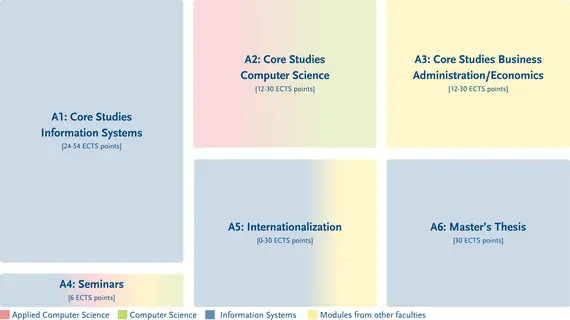Structure and Curriculum
The master's programme "Information Systems" consists of six module groups.
The contents of the individual sections are briefly presented below. Detailed information on courses and modules within the sections can be found in the module handbook of the degree programme (cf. section Regulations and Documents).
Within this module group, students can deepen and extend the knowledge of business informatics acquired in the previous degree programme, depending on the current range of courses.
Exemplary module selection options:
- Data-driven Decision Support
- Modulare and On-Demand Systems
- Optimization of IT-Reliant Processes
- Digital Health
- Managing Digital Transformation
- Global Collaboration and Digital Social Innovation
- Digital Society and AI-based Systems
- Social Network Analysis
- Managing Digital Platforms
- Standards and Networks
- Digital Change Management
- Intra-Organizational Systems
- Hybrid Intelligence
- Network Theory
- Digital Platforms in Industries and Society
- Business Intelligence & Analytics
The module group offers a wide range of specialisation options from the (Applied) Computer Science subject groups.
Exemplary module selection options:
- Functional Programming of Reactive Systems
- Mobile Communication
- Advanced Data Management
- Information Retrieval
- Usability in Practice
- Deep Learning
- Introduction to Dialogue Systems
This module group comprises various elective modules from the Business Administration department for further individual specialisation.
Exemplary module selection options:
- Business Taxation
- International Finance
- Organizational Innovativeness and Creativity
- Accounting
- Sustainability and Responsibility in Management
- Leadership and Management Development
- Corporate Strategy and Growth
Seminars are the focus of the A4 module group. These deal with particular topics and issues pertaining to the various subsections of Information Systems, Computer Science and Applied Computer Science, as well as Business Administration and Management.
Contribution of credits from a university abroad (guidedstudy abroad programme) or in the field offoreign business languages, e.g: Business English, Business French, Business Italian, Business Spanish, Business Russian.
Independent work on an advanced topic from a subject in the Information Systems subject group or from another subject in accordance with the study and examination regulations over a period of 6 months. The Master's thesis must be defended orally.
Continue to Application and Admission.
